The Retail Radeon HD 7870 Review: HIS 7870 IceQ Turbo & PowerColor PCS+ HD7870
by Ryan Smith on March 19, 2012 9:00 AM EST- Posted in
- GPUs
- AMD
- PowerColor
- Radeon HD 7000
- HIS
Power, Temperature, & Noise
Up next, we wrap up our look at a new video card’s stock performance with a look at the physical performance attributes: power consumption, temperatures, and noise. Thanks to TSMC’s 28nm process the 7800 series is already setting a new bar for the amount of performance they offer under 200W. How can these factory overclocks and custom coolers capitalize on that? Let’s find out.
| Radeon HD 7870 Voltages | ||||
| Ref 7870 Load | HIS IceQ Turbo 7870 Load | PowerColor PCS+ HD7870 Load | ||
| 1.219v | 1.219v | 1.219v | ||
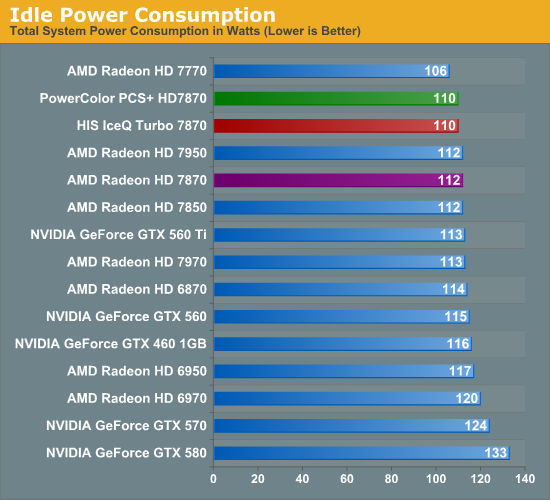
Since both the PCS+ HD7870 and IceQ Turbo 7870 are semi-custom designs using AMD’s PCB, the impact they can have on idle power usage is minimal, but not non-existent. Our tests register a 2W difference, which may be due to the different fans these designs use, or perhaps a consequence of the slightly lower idle temperatures they hit.
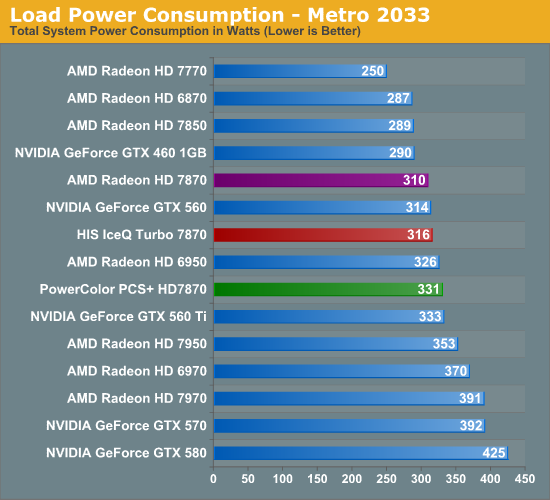
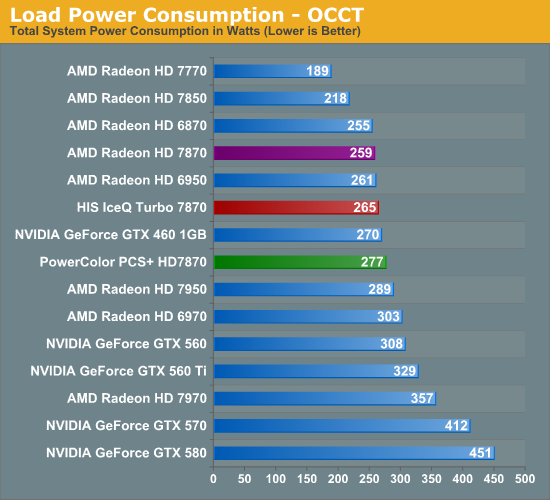
Load power consumption ended up being more wild than we expected. At 331W under Metro and 277W under OCCT, the PCS+ HD7870 performs how we’d expect an overclocked 7870 to perform. That is to say that power usage has increased slightly, but since there’s no increase in core voltage the difference is 20W or less at the wall, confirming the fact that these factory overclocks have little impact on power consumption and are largely free.
But then we have the IceQ Turbo 7870, which barely registers above the reference 7870. Why the difference? It comes down to two things; one of course is chip-to-chip variability, but there’s also the matter of the relationship between leakage and temperatures. As we’ll see when we get to our temperature testing, the IceQ Turbo is so effective at cooling that it stays nearly 10C under the other 7870s, which reduces the power consumption of the GPU.
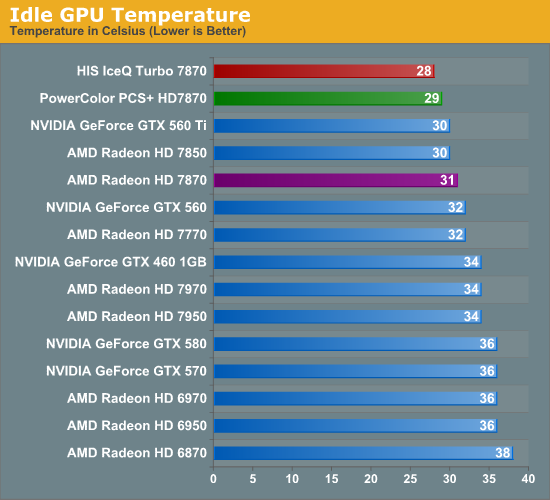
There are no big surprises under idle temperatures, but open air coolers once again lead the pack. With both cards having idle temperatures below 30C, neither card is getting a whole lot warmer than the room temperature.
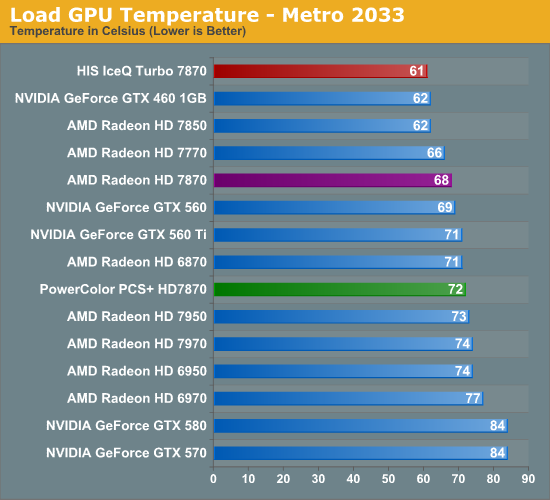
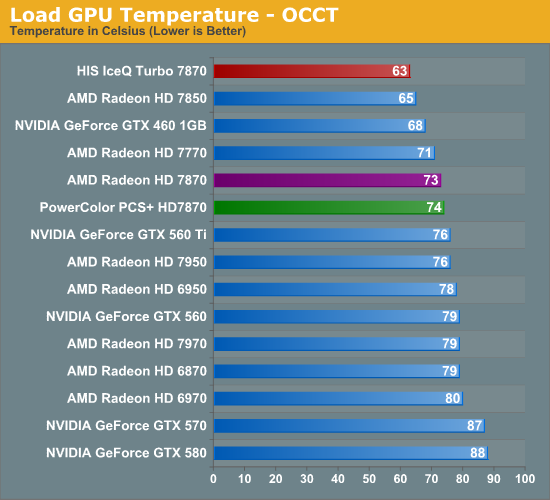
It’s once we get to load temperatures that we really get an interesting situation on our hands. The PCS+ HD7870 ends up being up to a few degrees warmer than the reference 7870, thanks to the recirculation of hot air due to the open air cooler, and the use of a stacked DVI design that further limits external venting. As we’ll see this is a temperature/noise tradeoff, and not a bad one to make given AMD’s aggressive cooling on the 7000 series, but the result is that the PCS+ 7870 is warmer.
Then we have the IceQ Turbo 7870. The IceQ is effectively a triple wide card and it has the cooling performance to go with it. At 61C under Metro and 63C under OCCT it’s cooler than any modern reference card, even the GTX 460. 63C under OCCT for a 190W card is especially impressive and not very easy to accomplish. The IceQ is one cool card, literally. But does it have the noise to match its cool demeanor?
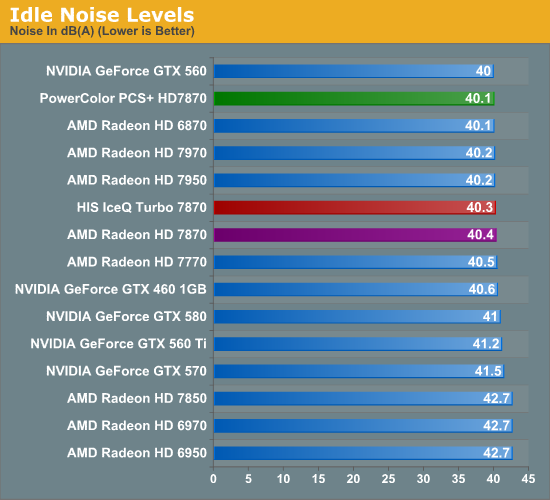
Idle noise levels are consistent. Both cards are ever so marginally quieter than the reference 7870 at idle.
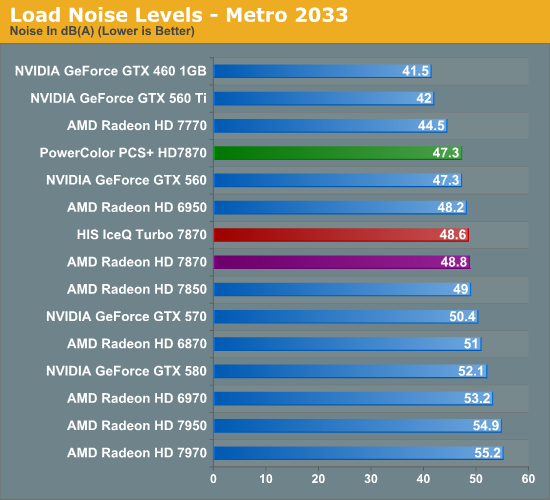
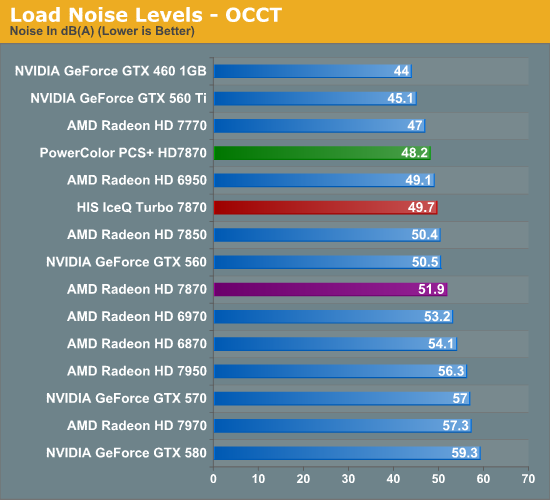
When it comes to load noise, both cards show their superiority over the reference 7870. The PCS+ HD7870 makes the temperature/noise tradeoff we mentioned earlier, and as a result it’s anywhere between 1.5dB and 3.7dB quieter than the reference 7870, keeping the card at a cozy noise level below 50dB. This isn’t the domain of silent cards, but you can do very well for fairly little noise.
The IceQ Turbo 7870 ends up being a surprise. Numerous times before we’ve seen loud & cool cards, but it’s rare to come across a quiet and cool card. In spite of the large blower on the card and the temperatures we’ve seen, the IceQ Turbo does well for itself, ending up quieter than the reference 7870 in both tests. It can’t reach the PCS+ HD7870 here, but it still manages to stay below 50dB, which makes it’s sub-65C temperatures we saw earlier all the more impressive.
All things considered both cards do well for themselves in our power/temp/noise testing, which is what we’d expect for open air coolers (and hybrids) going up against AMD’s reference 7870 and its complete blower design. There is an obvious tradeoff that should not be ignored here – both cards are circulating much more hot air inside of the case, making an airy case a wise partner for these cards, but if you have the right case you can beat the blower. Otherwise in a stuffy case both cards would be ill advised given just how much of that 190W can find its way back inside the case.










53 Comments
View All Comments
Cisephys - Tuesday, March 20, 2012 - link
Any word on retail availability? Some 7850/7870 cards finally popped up on NewEgg this morning (or maybe late last night), but the PowerColor one there is not the PCS+ version, it's the stock, non-factory-overclocked one.Seems like a fairly clumsy launch... But then, I'm likely just impatient.
CeriseCogburn - Tuesday, March 20, 2012 - link
Why didn't the article mention it's near barren ?Is this now 'just forgotten" ?
Is AMD favored this much ?
Really it is absolutely unbelievable the bribe must be spectacular.
( i believe it's the free Island Vacation AMD sponsors for 500 of these 'lucky reviewers" - it's an 'information and learning gathering' and 'fact finding mission', of course...
--
It's actually missing from the entire article... the phrase paper launch let alone 'availability" is washed over as we are told AMD has after 'unveiling" two weeks ago 'released to retail '...
So will this be another 2.5 months of near barren shelves ?
How is it we hear nothing on this matter in the entire article... what sorry excuse will we be given - if any at all.
There's no mention of manipulating the market with this underhanded tactic and early empty release either ...
Sorry it's just inexcusable and no you're not impatient, we've been deceived.
CeriseCogburn - Wednesday, March 21, 2012 - link
That excuse is beyond ridiculous, as the higher the cards level, the more likely it is one has a willing and avid overclocker.It's really getting deep in here. 6970 6950 both top cards of this level a gen back were proclaimed as highly valuable for the OC bias switch.
I mean it's really, really deep in here, my chest is soaked and fear I might be drinking slop soon
Let's just tell the truth,
AMD fans love this, this time.
But when the nVidia based GTX460 EVGA OC was included to trounce the amd cards in price/perf, the outcry was nothing short of enormous.
Worse yet, we have just recently been treated to exclamation points on the 7970 20% possible on stock volt Oc'ing raves.
It's really sad, now please, I'd like to not have to brush my teeth and gargle right now.